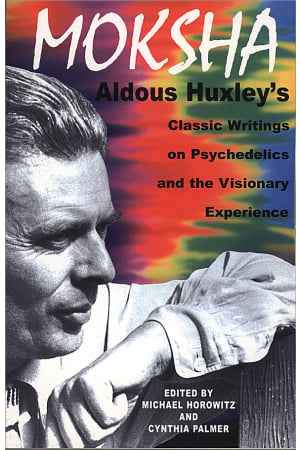Moksha
Aldous Huxley's Classic Writings on Psychedelics and the Visionary Experience
- Pages: 304
- Book Size: 5.38 x 8.25
- ISBN-13: 9780892817580
- Imprint: Park Street Press
- On Sale Date: April 1, 1999
- Format: Paperback Book
• Includes letters and lectures by Huxley never published elsewhere.
In May 1953 Aldous Huxley took four-tenths of a gram of mescaline. The mystical and transcendent experience that followed set him off on an exploration that was to produce a revolutionary body of work about the inner reaches of the human mind. Huxley was decades ahead of his time in his anticipation of the dangers modern culture was creating through explosive population increase, headlong technological advance, and militant nationalism, and he saw psychedelics as the greatest means at our disposal to "remind adults that the real world is very different from the misshapen universe they have created for themselves by means of their culture-conditioned prejudices." Much of Huxley's writings following his 1953 mescaline experiment can be seen as his attempt to reveal the power of these substances to awaken a sense of the sacred in people living in a technological society hostile to mystical revelations.
Moksha, a Sanskrit word meaning "liberation," is a collection of the prophetic and visionary writings of Aldous Huxley. It includes selections from his acclaimed novels Brave New World and Island, both of which envision societies centered around the use of psychedelics as stabilizing forces, as well as pieces from The Doors of Perception and Heaven and Hell, his famous works on consciousness expansion.
Foreword by Humphry Osmond
Preface by Albert Hofmann
Introduction by Alexander Shulgin
Part I: Precognition
1 1931 A Treatise on Drugs
2 1931 Wantwed, a New Pleasure
3 1932 Soma
4 1936 Propaganda and Pharmacology
5 1944 A Boundless Absence
6 1952 Downward Transcendence
Part II: Psychedelic and Visionary Experience
7 1953 Letters
8 1953 May Morning in Hollywood
9 1953 Letters
10 1954 The Door of Perception
11 1954 Letters
12 1954 The Far Continents of the Mind
13 1955 Mescaline and the "Other World"
14 1955 Letters
15 1955 Disregarded in the Darkness
16 1955 Letters
17 1956 Heaven and Hell
18 1956 Brave New World Revisited
19 1956 Letters
20 1956 History of Tension
21 1957 Letters
22 1958 Chemical Persuasion
23 1958 Letters
24 1958 Drugs That Shape Men's Minds
25 1959 Letters
26 1959 The Final Revolution
27 1960 Letters
28 1960 The Art of Fiction
29 1960 Mushroom for Lunch
30 1960 Harvard Session Report
31 1961 Letters
32 1961 London Interview
33 1961 Visionary Experience (Copenhagen)
34 1961 Exploring the Borderlands of the Mind
35 1962 Love and Work
36 1962 Letters
37 Moksha
38 Letters
39 1963 Culture and the Individual
40 1963 O Nobly Born!
Appendixes
Source Notes
Index
Los Angeles Times
"A remarkably stimulating, worthwhile volume."
Publishers Weekly
"This book collects all of [Huxley's] words on the subject and is a valuable addition to the psychedelic literature."
"Then I read The Doors of Perception and Heaven and Hell, and it just rolled from there. That is what really put me over."
Terence McKenna, Archaic Revival
"Huxley had spent years preparing himself for the fearful psychedelic voyage, and he made it without question when it presented itself....He did it, and the world will never forget it."
Timothy Leary, Politics of Ecstasy
"[Huxley was] the world's most influential advocate of psychedelic drugs."
"A pharmacological goldmine, supplementing Huxley's classic, The Doors of Perception."
"A controversial, mind-expanding book that confirms Huxley's position...as the father of the modern drug movement."
Publisher's Weekly
"This collection supplies a good account, in breath and depth, of Huxley's views on psychedelic drugs and is an excellent place to start in exploring the larger implications of psychedelic drug research"
Lester Grinspoon & James Bakalar, Psychedelic Drugs Reconsidered
"The main writings of Aldous Huxley about psychedelics and the visionary experience have now been gathered into a single volume [which] should stand as an unparalleled guide to investigators."
Peter Stafford, Island Views
"The extraordinary richness with which Aldous Huxley describes the depth of his research on LSD and mescaline distinguishes him from thousands of researchers who have experimented with drugs over the years."
San Francisco Examiner-Chronicle
"Huxley was a gifted explorer of transcendental experience, spirituality, and consciousness expansion. It is this side of his remarkable mind that we glimpse in Moksha."
"Moksha is an exceptionally alive and illuminating track of the process of discovery."
Soho Weekly News
"Huxley was one of the first in the modern West to realize the potential value and spiritual implications of drugs. We are fortunate to have this experiential record of drug experiences."
Rhea A. White, Exceptional Human Experience Network
“Moksha is more than a book about psychedelics--although it may well be the most intelligent, well-rounded one of its kind. It is also another chance to spend hours in Huxley’s fascinating company as he talks about art, literature, religion, psychology, and ecology.”
--Los Angeles Times
“A remarkably stimulating, worthwhile volume.”
--Publisher’s Weekly
“The final chapter, climaxing in Laura Huxley’s description of her husband’s death, is one of the most transfixing pieces of reportage I’ve ever read.”
--Soho Weekly News
In May 1953, while in the company of his wife and a physician friend, Aldous Huxley took four-tenths of a gram of mescaline. The mystical and transcendent experience that followed set him off on an exploration that was to produce a revolutionary body of work about the inner reaches of the human mind. Huxley was decades ahead of his time in his anticipation of the dangers modern culture was creating through explosive population increase, headlong technological advance, and militant nationalism, and he saw psychedelics as the greatest means at our disposal to “remind adults that the real world is very different from the misshapen universe they have created for themselves by means of their culture-conditioned prejudices.” Much of Huxley’s writings following his 1953 mescaline experiment can be seen as his attempt to reveal the power of these substances to awaken a sense of the sacred in people living in a technological society hostile to mystical revelations.
Moksha, a Sanskrit word meaning “liberation,” is a collection of the prophetic and visionary writings of Aldous Huxley. It includes selections from his acclaimed novels Brave New World and Island, both of which envision societies centered around the use of psychedelics as stabilizing forces, as well as pieces from The Doors of Perception and Heaven and Hell, his famous works on consciousness-expansion. Also included are magazine articles, interviews, letters, and scientific papers that vividly demonstrate the evolution of his ideas and offer an engrossing record of the journey.
MICHAEL HOROWITZ and CYNTHIA PALMER are the directors of the Fitz Hugh Ludlow Memorial Library in San Francisco, the only library in the world devoted exclusively to the literature of mind-altering drugs. Michael Horowitz was Timothy Leary’s archivist and is coauthor of The High Times Encyclopedia of Recreational Drugs. Palmer and Horowitz live in northern California.







